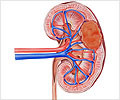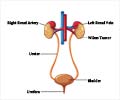Highlights
- Obesity, in spite of being a risk factor, is associated with better survival rates in kidney (renal) cancer than a low or normal Body Mass Index (BMI)
- There was a slower disease progression in obese patients.
- Pathological characteristics of the tumor growth were less dangerous in obese patients
- Obese patients responded better to targeted therapies and had better survival even with advanced disease.
This study, involving thousands of patients in four databases, has been published in the Journal of Clinical Oncology . Surprisingly, it showed that obese or overweight patients, especially those suffering from advanced or metastatic kidney cancer had slower rate of progression of the disease and better survival rates.
Results of the Dana Farber Study
In one cohort study, involving around 2000 patients, the median overall survival of patients with high BMI was 25.6 months while the low BMI patients showed a median survival of 17.1 months.
The study beginning in 2003, showed that the mortality rate of overweight patients was 16% less during the course of the study.
In the new study, Choueiri and his colleagues, including first author Laurence Albiges, PhD, earlier a visiting scientist at Dana-Farber, presently GU Medical Oncology Lead at Institut Gustave Roussy in France, validated these findings in four separate databases, which Choueiri said "makes this a very strong study."
Data provided from 19 centers of the International Metastatic Renal Cell Carcinoma Database Consortium (IMDC) were analyzed to determine the effect of BMI on patient survival and treatment outcome following first and second line Targeted therapy (TT). The height and weight of patients were also recorded at the start of therapy.
Results showed that treatment with targeted therapy (TT) in overweight or obese patients was independently associated with a better prognosis, even in patients having renal carcinoma that had spread to distant sites.
The researchers also analyzed pooled data on 4657 patients treated for renal cancer in clinical trials conducted between 2003 and 2013 in a validation set.
Molecular Studies of Obese Kidney Cancer Patients
Another database from The Cancer Genome Atlas (TCGA) project, included clinical and genomic information on 324 kidney cancer patients. The fourth database contained cancer tissue samples from 146 renal cancer patients who were treated at Dana-Farber and other centers affiliated to Harvard.
Analyzing the above two databases, the investigators looked for molecular level differences between patients having high and low BMI to try and explain why kidney tumors in obese and overweight patients were less aggressive and responded better to therapy.
The TCGA study did not show any differences in the tumors' DNA, such as mutations, that could explain the difference. However, when the scientists studied gene expression - the rate at which genetic information was being used by the cell to make proteins, they noticed a difference. Expression of a gene called fatty acid synthase (FASN) was found to be reduced in patients with high BMI when compared with normal BMI patients.
FASN and Cancer
FASN is a key enzyme involved in lipogenesis or fatty acid synthesis. Overexpression of FASN has been found in many types of cancer, to the extent that it has been nicknamed a ‘metabolic oncogene’.
FASN overexpression has been associated with a poor prognosis in several types of cancer, including kidney cancer.
As FASN expression was decreased or "downregulated" in overweight and obese kidney cancer patients, it would probably explain why these patients did better than those who were of normal weight and showed a higher FASN gene expression.
Possible Therapeutic Role for FASN Inhibitors in Kidney Cancer
The reason for FASN downregulation in obese patients isn't yet known. However the authors of the study say the results provide a valid reason for experiments aimed at inhibiting FASN expression in kidney cancer patients irrespective of their BMI, in an obvious effort to improve the prognosis. Inhibitors of FASN, including some naturally derived products, have been under development for several years and are considered to be an encouraging approach to cancer therapy.
"We plan to test FASN inhibitors in an animal model as a possible therapy for kidney cancer," said Choueiri.
About Kidney (Renal) Cancer
Renal cancer is a malignant growth involving the kidneys. Kidney cancer is the seventh most common cancer in men and tenth most common cancer in women. In 2016, an estimated 62,700 adults (39,650 men and 23,050 women) in the United States will be diagnosed with kidney cancer. There are three main types of kidney cancer.
- Renal cell cancer is commonly seenin adults.
- Wilms tumors are most commonly seen in children. These two types originate in the renal tubules (tissues of the kidney that form urine).
- Transitional cell canceris another type of kidney tumor occurring in adults, that forms in the renal pelvis and ureter.
-
Obesity plays contradictory roles in renal cancer, being a risk factor as well as a good prognostic indicator. FASN gene expression is downregulated in overweight kidney cancer patients, prompting scientists to look at the role of FASN inhibitors in Renal cancer.
"We plan to test FASN inhibitors in an animal model as a possible therapy for kidney cancer," said Choueiri.
Source-Medindia
















